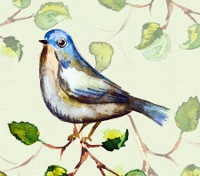Change is not always good.
There’s change coming….and I have to tell you I am not happy at all about it. In fact, I’m a little scared. Scared more for my children really than myself, and it is a kind of fear that is gnawing at me. It all started a few weeks ago when I saw on This Sunday Morning a report on animals that are rare or now, extinct. The photographer, Joel Satore, had just released a book entitled Rare. The Columbian Basin Pigmy Rabbit, the Wyoming Toad, the Grizzly Bear, the Whooping Crane, the Mexican Grey Wolf and the Red Wolf, just to mention a few. All of them are now gone, or very soon to be.
I immediately thought about our trip to New York, and the day we went to The Museum of Natural Science. I had some heavy questions to answer from a very inquisitive James Edward who had just discovered the dinosaur exhibits. “Why are they gone?” and “How did that hap- pen?” These were just a few of the in depth questions that I could see would lead to exhausting all of my knowledge of the hows and whys of animal extinction.
Those thought-provoking questions made me think of these other animals now facing extinction. Animals less fearsome, perhaps, than dinosaurs, and I began to feel a great sadness about the whole thing….that of extinction. It got me thinking about a lot of things.
Conservation was one, and becoming “greener” in the way I was raising my children. Then, the 40th anniversary of Earth Day came, and with it washed ashore a baby whale whose belly was filled with items carelessly discarded. I was bothered especially by this news, and with it brought another set of questions from both of my children. It was obvious to me that we, as a family, were going to reset our game plan for how we consumed and disposed of our daily living. I was feeling pretty good about our plans for change with summer fast approaching and both children very anxious to make sure we were doing our part. I was feeling just fine, until the oil spill….
I am no rocket scientist, but there’s just not a lot of messing around with safety when dealing with, essentially, the earth’s crust! Haven’t these people watched the Beverly Hillbillies? That crude came up in a roar and showered down a mess of mucky grossness that even television portrayed clearly. The latest disaster pales in comparison to all others by what it’s doing to our beaches and wildlife. The bayous and beaches of Louisiana are home to a whopping 40% of all of the coastal wetlands in the continental U.S.! I am not telling you anything you haven’t already read or watched on television. I’m just angry about it – really, really angry. After researching this massive disaster that will have a lasting impact on our environment for years to come, I feel compelled to share with you what I have discovered.
Time magazine reported that, “It’s only in the Gulf of Mexico, whose waters yield nearly a third of U.S.-produced oil, and resource rich Alaska that a moratorium on off-shore drilling has never been considered. The results have been an outsourcing of America’s off shoring to countries like Kazakhstan and Angola, which are rapidly becoming the world’s new oil powers. Their fields may hold billions of barrels of petroleum, but their environmental standards are nonexistent. Nigeria – a petrol state that produces more than 2 mil- lion barrels of oil a day, has spills equal to that of the Exxon Valdez about every year.
New America’s Margonelli states: There’s a huge mass of consumers in the U.S. who just want oil to be cheap and don’t want to think about the externalization. And who don’t care about oil spills on the west coast of Africa.” (Time, May 17, 2010, “The Meaning of the Mess” by Bryan Walsh)
Well, I care! And I think if everyone were to actually become aware of the situation, they would care more too.
I am sickened by the ramifications of such carelessness on our wildlife, and on the livelihoods of so many fishermen. The birds and turtles are coming up covered in a gross, reddish muck. In addition, there will be a lot missing from our beaches and our dinner plates for many years to come. One very special act of nature may never ever happen again – that of a rare occurrence called a jubilee. Fishery experts say it’s not uncommon for shallow bays to have oxygen deprivation, known as ‘hypoxic events,’ for short periods of time that bring some fish to the surface.
Experts say the combination of factors in Mobile Bay that sends thousands of fish and crustaceans to the shore all at once — and that the critters are all alive — is unique to the area. At 74, Doris is known as the Jubilee Watcher of Point Clear. With the oil slick in the Gulf, Doris and other locals are wondering about the fate of jubilees. Even if the slick misses Mobile Bay, will the ‘jubilee’ seafood be safe to eat? What will happen if the crabs, flounder, and others rise to the surface in thick black crude? “The stench of the seafood will be a horrible thing,” Doris says. “Stop to think about thousands and thousands and thousands of crabs, fish, porpoises and sharks, all coming to shore dead.”
Doris has a unique idea on how to plug the oil well that has leaked 210,000 gallons of crude a day into the Gulf. Her plan involves BP executives. “Bunch them up and stick them in that great big hole that they’re trying to stop up. Excuse my being ugly,” she says in a Southern drawl, “but that’s what I think about them.” (“Oil threatens Alabama’s jolly good time”, May 17, 2010 by Wayne Drash) I am right there with her!
And so, it has come full circle. There’s lots of change coming, and I’m a little scared. We should feel responsible to our earth and all its living creatures. I have a new respect for dinosaurs and baby whales and boy am I going to really miss my oysters and my shrimp! More importantly, it’s insane to think we can waste our natural resources and watch calmly as animals one by one disappear. We are, after all, animals too. Things are changing, and it should make us all very nervous.




